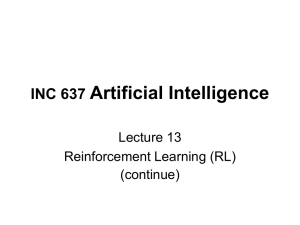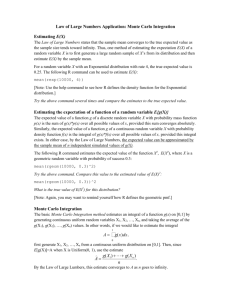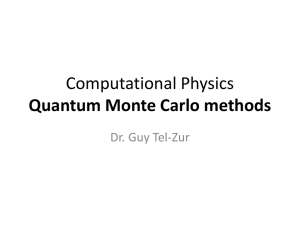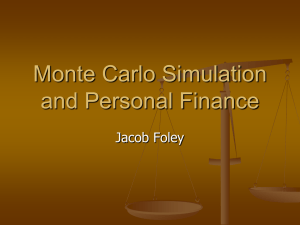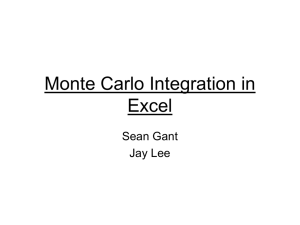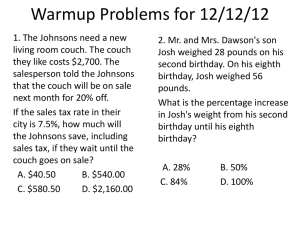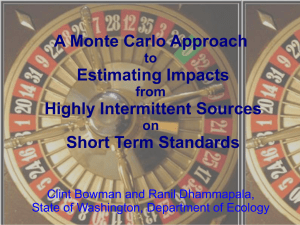Monte Carlo Simulations
advertisement
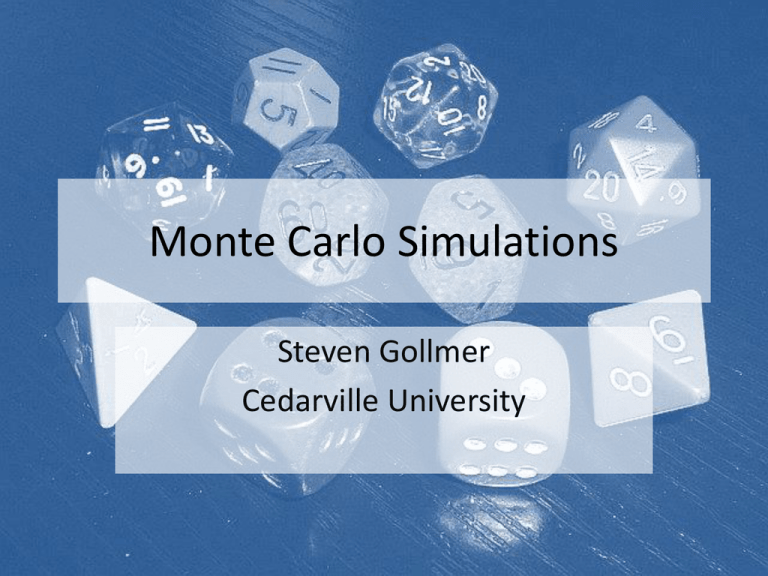
Monte Carlo Simulations Steven Gollmer Cedarville University Meet and Greet Game • Are there people here who share the same birthday? – Most births occur in September & October – October 5th is the most common birthday – May 22nd is the least common birthday • What does this have to do with Monte Carlo? – What is the probability that at least one pair of people share a birthday in this room? Birthday Attack • Hash functions convert arbitrary length data into a fixed length string of data. • Passwords can be hashed for quicker verification. • Documents can be hashed and assigned to a digital signature. • Collisions occur when documents hash to the same value. What impact does hashing have on security? Cracking a password with a 64 bit hash with 100,000 attempts/second could take 5.8 Myr, but a collision with the hacker’s guess will likely occur in 14 hr. Probability • Terms – Event (A) – The outcome of an experiment. – Sample space (W) – All possible outcomes for an experiment. A – Probability – Ratio of |A| to |W | P ( A ) W • What is the probability of rolling a seven on two dice? Probability of Rolling 7 Probability 0.2 0.15 2 0.1 3 0.05 0 2 4 6 8 Sum of Dice P (7 ) 10 12 4 6 36 • Chances are 1 out of 6 5 6 7 8 9 10 11 12 Birthday Problem • What is the probability of shared birthdays if there are N people in the room? – N = 1, P(1) = 0% – N = 365, P(365) = 100% – N = 3, P (3) 365 364 3 365 In General 365 k P(N ) 365 k! N 3 ni ni ! 365 1 364 A A B A B A B A A 0 . 82 % Combinations N! i! Choices Additional Complications • What about 2 pairs of shared birthdays? • What about triple shared birthdays? • Are birthdays evenly distributed throughout the year? Monte Carlo Simulation • Run multiple experiments, N0 – Individual outcomes are either 0 or 1 (Failure or Success) – Total number of successes, Ns • Running more experiments give more accurate results. Probability p N s N0 Relative error Es 1 p N s Calculate the value of p Find the % of points falling within a circle of radius 1. N0 = 10,000 • p = 0.78140 • p = 3.1256 ± 0.0331 N0 = 100,000 2 Ap r • p = 0.78522 • p = 3.1409 ± 0.0104 Monte Carlo – Birthday Problem • 30 people in a room • Count when collisions occur • Probability theory – p = 0.7063 Non-Uniform Birthday Problem • Theory – 70.63% • Monte Carlo – N=1k, p=70.4 ± 2.9% – N=10k, p=71.39 ± 0.90% – N=100k, p=70.90 ± 0.29% – N=1M, p=70.95 ± 0.09% • Normal Distribution – 95% confidence interval – 2s Hypothesis Testing • Hypothesis: Does a non-uniform birthday distribution give a significantly different probability to the birthday problem? • Test: Ran 2 Monte Carlo simulations using a uniform and nonuniform birthday distribution. • Conclusion: With a confidence level better than 95%, the hypothesis is verified. If a higher confidence is desired, use more experiments. How well do climate models handle transport of sunlight? • Models assume that where clouds exist, they have uniform optical properties. • Marine Stratocumulus • Off coast of S. California • Representative of uniform clouds. • How do you test if this assumption is valid? Fractal Clouds and Monte Carlo • Water content is redistributed using a fractal algorithm. • Send photons through the non-uniform cloud. – 4096 bands – 4 M photons • Albedo – % reflected – 15% difference at 60% albedo – <1% smoothing from horizontal transport. Other Applications • Radiation Therapy – Dosage from multiple photon scattering in tissue. • Telescope design – Impact of different configurations. • NOAA POES MEPED – Measure particle radiation that can disrupt communications. Conclusion – Monte Carlo Simulations • Advantages – Bypass the complexity of solving problems by analytical methods ( trigonometry, calculus, D.E., etc.) – Give solutions to problems too costly to compute using standard numerical methods. – Easily distributed to multiple processors or GPU’s • Disadvantages – Solution is statistical by nature. – High precision comes at a high computational cost. – Best used for problems with limited observables. Credits • www.r-project.org – R statistics program • NASA & NOAA – Image source • Wikipedia – General information and public commons images. • Cahalan et al. 1994. Independent Pixel and Monte Carlo Estimates of Stratocumulus Albedo. J. Atmos. Sci. 51:3776-90. • http://www.dartmouth.edu/~chance/teaching _aids/data/birthday.txt (1978 birthday data)

